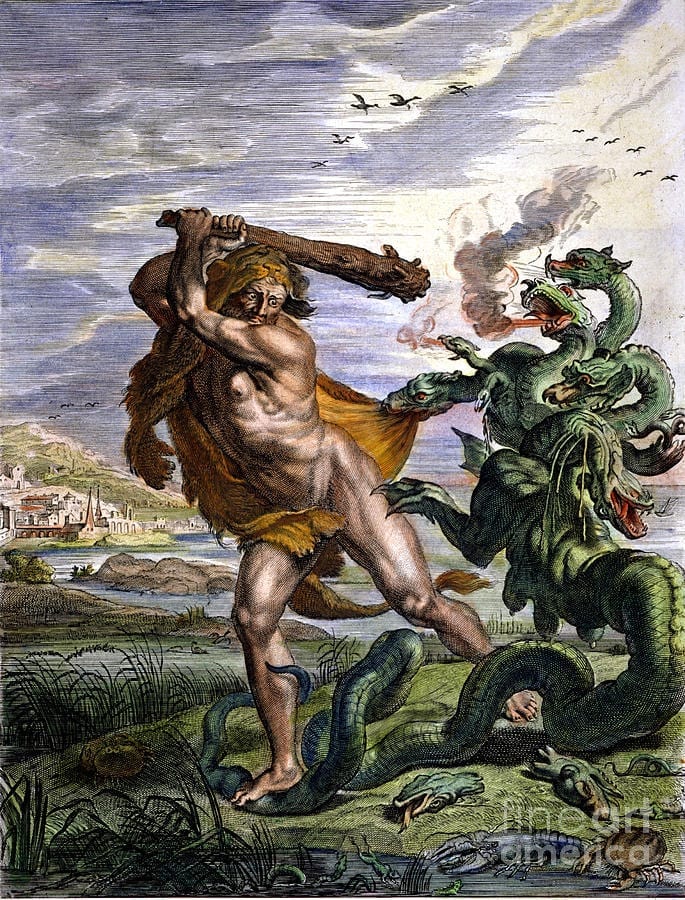
Hercules was the son of Jupiter and Alcmene—a lovely princess, the granddaughter of Perseus and Andromeda. Juno hated her as she did all her mortal rivals, and sought to bring misery and suffering on the unoffending maiden. When she learned that Hercules, the son of Alcmene, was born, she sent two immense serpents with poisonous fangs to attack the child while he slept. The baby happened to waken just as the creatures were twining themselves about him; and grasping their necks in each of his tiny hands, he strangled them, thus showing from his birth the wonderful strength that was later to make him a famous hero.
The education of Hercules was intrusted to Chiron, the most renowned of the centaurs, who had himself been instructed by Apollo and Diana in hunting, medicine, music, and the art of prophecy. The idea of a creature half man and half horse was not repulsive to the ancients, who were too fond of a horse to consider man’s union with him degrading. When Hercules left the kindly tutelage of Chiron, he set out on his own adventures, and before he had traveled far he met two beautiful women, each of whom offered to guide him on his journey.
Kakia (Vice) told him that if he followed her, he would gain love, riches, and ease; and Arete (Virtue) promised him honor, bought at the price of hardship, poverty, and endless toil. For a while the youthful hero deliberated over the two very different rewards offered him, and at last he gave his choice to Arete, who henceforth led him through many perils, and into labors such as no man had ever yet performed.
Like most heroes, Hercules was a great wanderer; and on one of his journeys he came to the city of Thebes, where Creon, the king, entertained him and showed him so much favor that when Hercules asked for the hand of Creon’s daughter Megara in marriage, the king gladly gave his consent. The hero then rested from his wanderings, and spent many happy years in the society of his wife and children; but Juno had not forgotten her old hatred of Alcmene’s offspring, and she determined to end this happiness. So she afflicted Hercules with a sudden madness; and in his delirium he killed his wife, and threw his children into the fire. When at last he recovered his senses, he suffered terribly over the thought of the crimes that he had unwittingly committed, and would have gone off to the mountains to spend his days in sorrow and remorse, had not Juno demanded that he should expiate his deeds of bloodshed. Accordingly she sent Mercury to lead him from his solitude among the hills and to take him to his cousin Eurystheus, king of Argos, whom he was compelled to serve for a whole year. During this time he performed the twelve great labors that have made his name famous as the doer of mighty deeds.
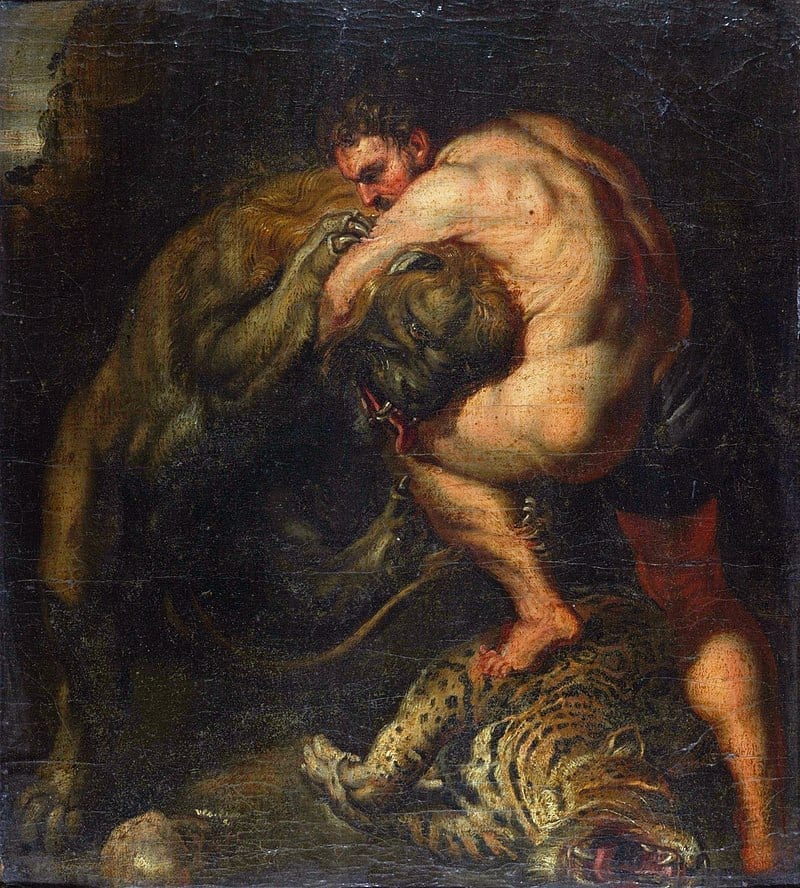
The first task that Eurystheus gave the hero was to procure the skin of a monstrous lion that inhabited the Nemean forest. This creature’s frequent attacks had brought terror to all the countryside, for it was not content with carrying off cattle and sheep, but had killed the children at play, and mangled shepherds who were watching with their flocks. When the people heard that Hercules was setting out to fight the lion, they tried to persuade him to give up the adventure; but he, who had strangled two huge serpents in his infancy, was not afraid of a lion, however fierce and strong it might be. So he boldly entered the forest, and having tracked the great brute to its den, he attacked it fearlessly and killed it with his bare hands. Then, throwing the body of the lion over his shoulder, he started back to the palace of Eurystheus; but when the king saw Hercules approaching, he begged him to leave his burden outside the city gates. So the hero skinned the lion, and took the shaggy pelt to be henceforth his favorite covering.

Hercules’s second labor was to kill the Hydra, a nine-headed monster that infested the marshes of Lerna. With the blows of his great oak club the hero was able to strike off eight of the heads, but the central one was immortal and could not be destroyed. Further to complicate the difficulty, Hercules found that as soon as he struck off one head, two others sprang up in its place. To prevent this discouraging miracle from continuing, the hero bade his friend Iolaus, who had accompanied him, take a lighted brand and sear the wounds as soon as they were made. Through this wise precaution the Hydra was finally killed, and its one immortal head was buried under a huge rock. While this difficult struggle was going on, Juno, always eager to thwart the hero, sent a large crab to pinch Hercules’s feet as he wrestled with the Hydra. He succeeded in crushing it with his club; but Juno did not leave its body on the trampled and blood-stained ground. In recognition of its services to her, she placed it in the sky as the constellation of Cancer (the Crab). Before Hercules left the dead Hydra he dipped some arrows in its venomous blood, knowing that any wound received from their poisoned tips would surely be fatal. These arrows were later of great service to Hercules, and only once did he regret their deadly quality.
The next task that Eurystheus set was the capture of the golden-horned and brazen-hoofed stag of Cerynea, which ran so swiftly that it did not seem to touch the ground. Hercules pursued the stag for many miles, but was unable to overtake it until he drove it into the cold regions of the north, where its fleetness was hindered by the great drifts and the ice-covered ground. Finally the stag ran into a deep snow bank, and so Hercules captured it and took it home in triumph.
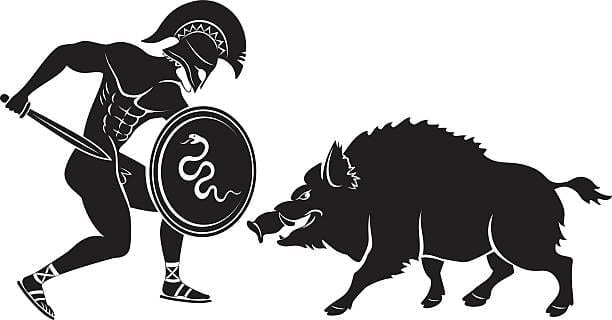
The fourth labor to which Hercules lent his great strength was the killing of a wild boar that haunted Mount Erymanthus in Arcadia. While on this expedition, the hero was attacked by the centaurs, and when he shot at them with his poisoned arrows, one of the deadly missiles flew far and struck his loved tutor Chiron, who was galloping toward the combatants, hoping to settle the quarrel peaceably. When Hercules saw Chiron fall, he rushed to his side and tried to stanch the fatal wound; but the dying centaur knew that his end had come, and sorrowfully bade the hero farewell. To reward Chiron for his long service, the gods transferred him to the heavens as the constellation Sagittarius. Hercules was next sent to kill the flock of fierce birds whose cruel beaks and sharp talons made havoc in the country around Lake Stymphalus. The foul mist that rose from the stagnant water over which the birds hovered was so deadly to breathe that Hercules could hardly approach the lake; but with the help of his poisoned arrows he was able to wound the birds at a distance. After hours spent in this pestilent atmosphere he killed the entire flock and returned to the court of Eurystheus to report his success.
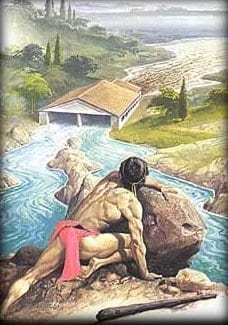
The most unpleasant of all Hercules’s labors was the cleaning of the stables where Augeas, king of Elis, kept his herd of a thousand oxen. These stables had not been cleaned for thirty years; and when Hercules caught one glimpse of the filth within them, he felt that this was too degrading a task for him to undertake. But the work had to be done; and since he could not put his hand to anything so foul, he looked about for some other means to accomplish the labor. Not far from the stables flowed two rivers, the Peneus and Alpheus, and these Hercules turned out of their courses and made them rush through the filthy building until every part of the stables of Augeas was washed perfectly clean. Then he restored the rivers to their former beds, and returned home to report this task fulfilled.
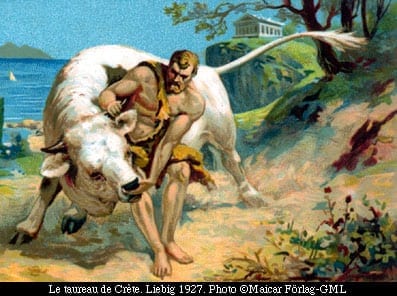
The next labor that was assigned to the hero was the capture of a mad bull given by Neptune to King Minos. In the early days of his power, Minos had boasted that he could obtain anything that he wished from the gods; and had accordingly begged of Neptune a bull for the sacrifices. The kindly sea-god sent a splendid offering, but when Minos saw the bull’s size and beauty, he resolved to keep it. So he substituted another animal for the sacrifices. This angered Neptune so much that he made the bull go mad; and it rushed here and there over the island, causing great terror among the people. The creature was finally caught and overcome by Hercules, who rode it through the waves to Greece. The offspring of this bull was the famous Minotaur which the hero Theseus pursued through its labyrinth, and slew.
The eighth labor of Hercules was to bring from Thrace the horses of Diomedes. These splendid creatures the king fed on human flesh; and in order to get a sufficient supply of fresh meat, he decreed that all strangers who came into his kingdom should be imprisoned, fattened up, and then served as food to the horses. To punish Diomedes for his years of cruelty, Hercules fed him to his own steeds, and then led them back to Eurystheus, who was proud to be the possessor of such a prize.
At the court of Eurystheus was the king’s beautiful daughter, Admete, who loved purple and fine linen, and decked herself with all the jewels that her father’s wealth could command. One day Admete heard a traveler telling wonderful tales of the girdle that was worn by Hippolyte, queen of the Amazons; and at once the spoiled princess demanded of her father that he send Hercules to procure for her the coveted girdle. So the hero set out again, accompanied by his friend Iolaus; and after a hard and perilous journey came to the country of the Amazons. These were a fierce, warlike nation of women who kept in their tribe only the girls who were born among them and disposed of the boys by killing them, or by giving them to the neighboring peoples. The girls were trained in severe military discipline, and became a race of very redoubtable warriors whom no king cared to treat with contempt. When Hercules came before the queen Hippolyte, she received him kindly, listened to the explanation of his visit, and even promised to give him the girdle that the selfish Admete coveted. Before the hero and his friend set out on their journey homeward, the queen entertained them royally with feasting and games that lasted several days. Meantime Juno saw an opportunity for indulging her hatred of Hercules; and taking the form of an Amazon, she mingled freely with the women. By pretending to have received a heaven-sent message, she persuaded them that the stranger had used the girdle as a mere pretext for his visit, and that his real intention was to carry off the queen. The Amazons believed this artfully-contrived report, and rushed in a body to protect Hippolyte. They attacked Hercules fiercely, but he beat them off and finally escaped with his friend, but not before he had killed several of the Amazons, including the queen who had befriended him. With the dearly-bought girdle he returned homeward, and on the way he heard the proclamation of Laomedon that whoever would save his daughter Hesione from the sea-monster should receive a large reward. Hercules killed the beast and freed the maiden, but was obliged to leave Troy without the promised gold, because of Laomedon’s perfidy and greed.
When the ancients looked each evening at the glowing west, they pictured it as a far-distant country, more wonderful than any ever seen by mortal eyes. Here in this land of heart’s desire lay the Garden of the Hesperides, where a dragon guarded the golden apples that grew on a wonderful tree which had sprung up miraculously to grace the wedding of Jupiter and Juno. In this far-off sunset land were also the Isles of the Blest, where mortals who had led virtuous lives were transported without ever tasting of death. Here the blessed of the gods enjoyed an eternity of bliss; and wandered happily over the Isles, which had a sun and moon and stars of their own, and never felt the touch of wintry winds. In this mysterious region of the west was the island of Erythea, called “the red” because it glowed in the light of the setting sun. To this spot Hercules was sent to take possession of the oxen of Geryon—a monster with three bodies.
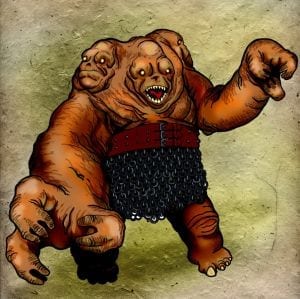
On his journey to the island, Hercules’s way was blocked by a huge mountain; and with one blow of his strong oak club he cleft the opposing rock, and allowed the waters of the sea to flow through. This is now the strait of Gibraltar, and the cliffs on either side are called the Pillars of Hercules.
When the hero reached the island of Erythea, he found the oxen guarded by the giant Eurytion and his three-headed dog; but even this did not daunt the slayer of the Hydra. He boldly attacked the giant; and after a fierce battle, in which his oak club stood him in good stead, killed both Eurytion and the monstrous dog. Then he went in search of the oxen, and, after herding them closely, drove them toward his own country. On the journey homeward he passed Mount Aventine, where the giant Cacus lived in a rocky cave. One night, as Hercules was asleep near the mountain, the giant stole part of the cattle; and, to deceive the hero, he dragged them backwards by their tails into his cave. Hercules might have been tricked by this stratagem if the stolen oxen had not lowed loudly as the rest of the herd passed the cave, and so betrayed their hiding place. Hercules rushed into the giant’s dark, ill-smelling dwelling, slew him, and recovered all the stolen cattle.

